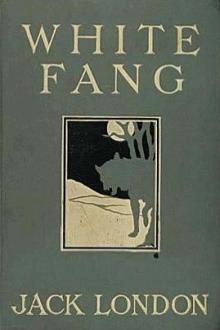Brown Wolf and Other Jack London Stories by Jack London (chromebook ebook reader txt) 📕

- Author: Jack London
Book online «Brown Wolf and Other Jack London Stories by Jack London (chromebook ebook reader txt) 📕». Author Jack London
full-and-by, in a stiff breeze. Every sail was set and drawing, including the staysails. Captain Cullen strolled for'ard along the poop. He strolled carelessly, glancing at the passenger out of the corner of his eye. Dorety was looking the other way, standing with head and shoulders outside the companionway, and only the back of his head was to be seen. Captain Cullen, with swift eye, embraced the mainstaysail-block and the head and estimated the distance. He glanced about him. Nobody was looking. Aft, Joshua Higgins, pacing up and down, had just turned his back and was going the other way. Captain Cullen bent over suddenly and cast the staysail-sheet off from its pin. The heavy block hurtled through the air, smashing Dorety's head like an egg-shell and hurtling on and back and forth as the staysail whipped and slatted in the wind. Joshua Higgins turned around to see what had carried away, and met the full blast of the vilest portion of Captain Cullen's profanity.
"I made the sheet fast myself," whimpered the mate in the first lull, "with an extra turn to make sure. I remember it distinctly."
"Made fast?" the captain snarled back, for the benefit of the watch as it struggled to capture the flying sail before it tore to ribbons. "You couldn't make your grandmother fast, you useless scullion. If you made that sheet fast with an extra turn, why didn't it stay fast? That's what I want to know. Why didn't it stay fast?"
The mate whined inarticulately.
"Oh, shut up!" was the final word of Captain Cullen.
Half an hour later he was as surprised as any when the body of George Dorety was found inside the companionway on the floor. In the afternoon, alone in his room, he doctored up the log.
" Ordinary seaman, Karl Brun," he wrote, "lost overboard from foreroyal-yard in a gale of wind. Was running at the time, and for the safety of the ship did not dare come up to the wind. Nor could a boat have lived in the sea that was running ."
On another page, he wrote:--
" Had often warned Mr. Dorety about the danger he ran because of his carelessness on deck. I told him, once, that some day he would get his head knocked off by a block. A carelessly fastened mainstaysail sheet was the cause of the accident, which was deeply to be regretted because Mr. Dorety was a favorite with all of us ."
Captain Dan Cullen read over his literary effort with admiration, blotted the page, and closed the log. He lighted a cigar and stared before him. He felt the Mary Rogers lift, and heel, and surge along, and knew that she was making nine knots. A smile of satisfaction slowly dawned on his black and hairy face. Well, anyway, he had made his westing and fooled God.
[Illustration]
THE HEATHEN
I met him first in a hurricane; and though we had gone through the hurricane on the same schooner, it was not until the schooner had gone to pieces under us that I first laid eyes on him. Without doubt I had seen him with the rest of the kanaka crew on board, but I had not consciously been aware of his existence, for the Petite Jeanne was rather overcrowded. In addition to her eight or ten kanaka seamen, her white captain, mate, and supercargo, and her six cabin passengers, she sailed from Rangiroa with something like eighty-five deck passengers--Paumotans and Tahitians, men, women, and children each with a trade box, to say nothing of sleeping-mats, blankets, and clothes-bundles.
The pearling season in the Paumotus was over, and all hands were returning to Tahiti. The six of us cabin passengers were pearl-buyers. Two were Americans, one was Ah Choon (the whitest Chinese I have ever known), one was a German, one was a Polish Jew, and I completed the half dozen.
It had been a prosperous season. Not one of us had cause for complaint, nor one of the eighty-five deck passengers either. All had done well, and all were looking forward to a rest-off and a good time in Papeete.
Of course, the Petite Jeanne was overloaded. She was only seventy tons, and she had no right to carry a tithe of the mob she had on board. Beneath her hatches she was crammed and jammed with pearl-shell and copra. Even the trade room was packed full of shell. It was a miracle that the sailors could work her. There was no moving about the decks. They simply climbed back and forth along the rails.
In the night-time they walked upon the sleepers, who carpeted the deck, I'll swear, two deep. Oh! and there were pigs and chickens on deck, and sacks of yams, while every conceivable place was festooned with strings of drinking cocoanuts and bunches of bananas. On both sides, between the fore and main shrouds, guys had been stretched, just low enough for the foreboom to swing clear; and from each of these guys at least fifty bunches of bananas were suspended.
It promised to be a messy passage, even if we did make it in the two or three days that would have been required if the southeast trades had been blowing fresh. But they weren't blowing fresh. After the first five hours the trade died away in a dozen or so gasping fans. The calm continued all that night and the next day--one of those glaring, glassy calms, when the very thought of opening one's eyes to look at it is sufficient to cause a headache.
The second day a man died--an Easter Islander, one of the best divers that season in the lagoon. Smallpox--that is what it was; though how smallpox could come on board, when there had been no known cases ashore when we left Rangiroa, is beyond me. There it was, though--smallpox, a man dead, and three others down on their backs.
There was nothing to be done. We could not segregate the sick, nor could we care for them. We were packed like sardines. There was nothing to do but rot or die--that is, there was nothing to do after the night that followed the first death. On that night, the mate, the supercargo, the Polish Jew, and four native divers sneaked away in the large whale-boat. They were never heard of again. In the morning the captain promptly scuttled the remaining boats, and there we were.
That day there were two deaths; the following day three; then it jumped to eight. It was curious to see how we took it. The natives, for instance, fell into a condition of dumb, stolid fear. The captain--Oudouse, his name was, a Frenchman--became very nervous and voluble. He actually got the twitches. He was a large, fleshy man, weighing at least two hundred pounds, and he quickly became a faithful representation of a quivering jelly-mountain of fat.
The German, the two Americans, and myself bought up all the Scotch whiskey, and proceeded to stay drunk. The theory was beautiful--namely, if we kept ourselves soaked in alcohol, every smallpox germ that came into contact with us would immediately be scorched to a cinder. And the theory worked, though I must confess that neither Captain Oudouse nor Ah Choon were attacked by the disease either. The Frenchman did not drink at all, while Ah Choon restricted himself to one drink daily.
It was a pretty time. The sun, going into northern declination, was straight overhead. There was no wind, except for frequent squalls, which blew fiercely for from five minutes to half an hour, and wound up by deluging us with rain. After each squall, the awful sun would come out, drawing clouds of steam from the soaked decks.
The steam was not nice. It was the vapor of death, freighted with millions and millions of germs. We always took another drink when we saw it going up from the dead and dying, and usually we took two or three more drinks, mixing them exceptionally stiff. Also, we made it a rule to take an additional several each time they hove the dead over to the sharks that swarmed about us.
We had a week of it, and then the whiskey gave out. It is just as well, or I shouldn't be alive now. It took a sober man to pull through what followed, as you will see when I mention the little fact that only two men did pull through. The other man was the heathen--at least, that was what I heard Captain Oudouse call him at the moment I first became aware of the heathen's existence. But to come back.
It was at the end of the week, with the whiskey gone, and the pearl-buyers sober, that I happened to glance at the barometer that hung in the cabin companionway. Its normal register in the Paumotus was 29.90, and it was quite customary to see it vacillate between 29.85 and 30.00, or even 30.05; but to see it as I saw it, down to 29.62, was sufficient to sober the most drunken pearl-buyer that ever incinerated smallpox microbes in Scotch whiskey.
I called Captain Oudouse's attention to it, only to be informed that he had watched it going down for several hours. There was little to do, but that little he did very well, considering the circumstances. He took off the light sails, shortened right down to storm canvas, spread life-lines, and waited for the wind. His mistake lay in what he did after the wind came. He hove to on the port tack, which was the right thing to do south of the Equator, if--and there was the rub-- if one were not in the direct path of the hurricane.
We were in the direct path. I could see that by the steady increase of the wind and the equally steady fall of the barometer. I wanted him to turn and run with the wind on the port quarter until the barometer ceased falling, and then to heave to. We argued till he was reduced to hysteria, but budge he would not. The worst of it was that I could not get the rest of the pearl-buyers to back me up. Who was I, anyway, to know more about the sea and its ways than a properly qualified captain? was what was in their minds, I knew.
Of course the sea rose with the wind frightfully; and I shall never forget the first three seas the Petite Jeanne shipped. She had fallen off, as vessels do at times when hove to, and the first sea made a clean breach. The life-lines were only for the strong and well, and little good were they even for them when the women and children, the bananas and cocoanuts, the pigs and trade boxes, the sick and the dying, were swept along in a solid, screeching, groaning mass.
The second sea filled the Petite Jeanne's decks flush with the rails; and, as her stern sank down and her bow tossed skyward, all the miserable dunnage of life and luggage poured aft. It was a human torrent. They came head-first, feet-first, sidewise, rolling over and over, twisting, squirming, writhing, and crumpling up. Now and again one caught a grip on a stanchion or a rope; but the weight of the bodies behind tore such grips loose.
One man I noticed fetch up, head on and square on, with the starboard-bitt. His head cracked like an egg. I saw what was coming, sprang on top of the cabin, and from there into the mainsail itself. Ah Choon and one of the Americans tried to follow me, but I was
"I made the sheet fast myself," whimpered the mate in the first lull, "with an extra turn to make sure. I remember it distinctly."
"Made fast?" the captain snarled back, for the benefit of the watch as it struggled to capture the flying sail before it tore to ribbons. "You couldn't make your grandmother fast, you useless scullion. If you made that sheet fast with an extra turn, why didn't it stay fast? That's what I want to know. Why didn't it stay fast?"
The mate whined inarticulately.
"Oh, shut up!" was the final word of Captain Cullen.
Half an hour later he was as surprised as any when the body of George Dorety was found inside the companionway on the floor. In the afternoon, alone in his room, he doctored up the log.
" Ordinary seaman, Karl Brun," he wrote, "lost overboard from foreroyal-yard in a gale of wind. Was running at the time, and for the safety of the ship did not dare come up to the wind. Nor could a boat have lived in the sea that was running ."
On another page, he wrote:--
" Had often warned Mr. Dorety about the danger he ran because of his carelessness on deck. I told him, once, that some day he would get his head knocked off by a block. A carelessly fastened mainstaysail sheet was the cause of the accident, which was deeply to be regretted because Mr. Dorety was a favorite with all of us ."
Captain Dan Cullen read over his literary effort with admiration, blotted the page, and closed the log. He lighted a cigar and stared before him. He felt the Mary Rogers lift, and heel, and surge along, and knew that she was making nine knots. A smile of satisfaction slowly dawned on his black and hairy face. Well, anyway, he had made his westing and fooled God.
[Illustration]
THE HEATHEN
I met him first in a hurricane; and though we had gone through the hurricane on the same schooner, it was not until the schooner had gone to pieces under us that I first laid eyes on him. Without doubt I had seen him with the rest of the kanaka crew on board, but I had not consciously been aware of his existence, for the Petite Jeanne was rather overcrowded. In addition to her eight or ten kanaka seamen, her white captain, mate, and supercargo, and her six cabin passengers, she sailed from Rangiroa with something like eighty-five deck passengers--Paumotans and Tahitians, men, women, and children each with a trade box, to say nothing of sleeping-mats, blankets, and clothes-bundles.
The pearling season in the Paumotus was over, and all hands were returning to Tahiti. The six of us cabin passengers were pearl-buyers. Two were Americans, one was Ah Choon (the whitest Chinese I have ever known), one was a German, one was a Polish Jew, and I completed the half dozen.
It had been a prosperous season. Not one of us had cause for complaint, nor one of the eighty-five deck passengers either. All had done well, and all were looking forward to a rest-off and a good time in Papeete.
Of course, the Petite Jeanne was overloaded. She was only seventy tons, and she had no right to carry a tithe of the mob she had on board. Beneath her hatches she was crammed and jammed with pearl-shell and copra. Even the trade room was packed full of shell. It was a miracle that the sailors could work her. There was no moving about the decks. They simply climbed back and forth along the rails.
In the night-time they walked upon the sleepers, who carpeted the deck, I'll swear, two deep. Oh! and there were pigs and chickens on deck, and sacks of yams, while every conceivable place was festooned with strings of drinking cocoanuts and bunches of bananas. On both sides, between the fore and main shrouds, guys had been stretched, just low enough for the foreboom to swing clear; and from each of these guys at least fifty bunches of bananas were suspended.
It promised to be a messy passage, even if we did make it in the two or three days that would have been required if the southeast trades had been blowing fresh. But they weren't blowing fresh. After the first five hours the trade died away in a dozen or so gasping fans. The calm continued all that night and the next day--one of those glaring, glassy calms, when the very thought of opening one's eyes to look at it is sufficient to cause a headache.
The second day a man died--an Easter Islander, one of the best divers that season in the lagoon. Smallpox--that is what it was; though how smallpox could come on board, when there had been no known cases ashore when we left Rangiroa, is beyond me. There it was, though--smallpox, a man dead, and three others down on their backs.
There was nothing to be done. We could not segregate the sick, nor could we care for them. We were packed like sardines. There was nothing to do but rot or die--that is, there was nothing to do after the night that followed the first death. On that night, the mate, the supercargo, the Polish Jew, and four native divers sneaked away in the large whale-boat. They were never heard of again. In the morning the captain promptly scuttled the remaining boats, and there we were.
That day there were two deaths; the following day three; then it jumped to eight. It was curious to see how we took it. The natives, for instance, fell into a condition of dumb, stolid fear. The captain--Oudouse, his name was, a Frenchman--became very nervous and voluble. He actually got the twitches. He was a large, fleshy man, weighing at least two hundred pounds, and he quickly became a faithful representation of a quivering jelly-mountain of fat.
The German, the two Americans, and myself bought up all the Scotch whiskey, and proceeded to stay drunk. The theory was beautiful--namely, if we kept ourselves soaked in alcohol, every smallpox germ that came into contact with us would immediately be scorched to a cinder. And the theory worked, though I must confess that neither Captain Oudouse nor Ah Choon were attacked by the disease either. The Frenchman did not drink at all, while Ah Choon restricted himself to one drink daily.
It was a pretty time. The sun, going into northern declination, was straight overhead. There was no wind, except for frequent squalls, which blew fiercely for from five minutes to half an hour, and wound up by deluging us with rain. After each squall, the awful sun would come out, drawing clouds of steam from the soaked decks.
The steam was not nice. It was the vapor of death, freighted with millions and millions of germs. We always took another drink when we saw it going up from the dead and dying, and usually we took two or three more drinks, mixing them exceptionally stiff. Also, we made it a rule to take an additional several each time they hove the dead over to the sharks that swarmed about us.
We had a week of it, and then the whiskey gave out. It is just as well, or I shouldn't be alive now. It took a sober man to pull through what followed, as you will see when I mention the little fact that only two men did pull through. The other man was the heathen--at least, that was what I heard Captain Oudouse call him at the moment I first became aware of the heathen's existence. But to come back.
It was at the end of the week, with the whiskey gone, and the pearl-buyers sober, that I happened to glance at the barometer that hung in the cabin companionway. Its normal register in the Paumotus was 29.90, and it was quite customary to see it vacillate between 29.85 and 30.00, or even 30.05; but to see it as I saw it, down to 29.62, was sufficient to sober the most drunken pearl-buyer that ever incinerated smallpox microbes in Scotch whiskey.
I called Captain Oudouse's attention to it, only to be informed that he had watched it going down for several hours. There was little to do, but that little he did very well, considering the circumstances. He took off the light sails, shortened right down to storm canvas, spread life-lines, and waited for the wind. His mistake lay in what he did after the wind came. He hove to on the port tack, which was the right thing to do south of the Equator, if--and there was the rub-- if one were not in the direct path of the hurricane.
We were in the direct path. I could see that by the steady increase of the wind and the equally steady fall of the barometer. I wanted him to turn and run with the wind on the port quarter until the barometer ceased falling, and then to heave to. We argued till he was reduced to hysteria, but budge he would not. The worst of it was that I could not get the rest of the pearl-buyers to back me up. Who was I, anyway, to know more about the sea and its ways than a properly qualified captain? was what was in their minds, I knew.
Of course the sea rose with the wind frightfully; and I shall never forget the first three seas the Petite Jeanne shipped. She had fallen off, as vessels do at times when hove to, and the first sea made a clean breach. The life-lines were only for the strong and well, and little good were they even for them when the women and children, the bananas and cocoanuts, the pigs and trade boxes, the sick and the dying, were swept along in a solid, screeching, groaning mass.
The second sea filled the Petite Jeanne's decks flush with the rails; and, as her stern sank down and her bow tossed skyward, all the miserable dunnage of life and luggage poured aft. It was a human torrent. They came head-first, feet-first, sidewise, rolling over and over, twisting, squirming, writhing, and crumpling up. Now and again one caught a grip on a stanchion or a rope; but the weight of the bodies behind tore such grips loose.
One man I noticed fetch up, head on and square on, with the starboard-bitt. His head cracked like an egg. I saw what was coming, sprang on top of the cabin, and from there into the mainsail itself. Ah Choon and one of the Americans tried to follow me, but I was
Free e-book «Brown Wolf and Other Jack London Stories by Jack London (chromebook ebook reader txt) 📕» - read online now
Similar e-books:





Comments (0)